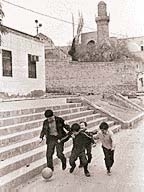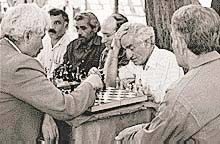
Autumn 1995 (3.3)
Leisure and
Play
Editorial
by Betty Blair

 Azerbaijanis, who
by nature are famous for their spirit of celebration, are starting
back to play these days. It's not just happening in homes and
clubs, it's evident everywhere. You see it more than ever in
courtyards, streets, and squares. Children gather to teach each
other the latest pop songs, play ball, jump rope, ride bikes
and walk dogs. Families and friends are seen strolling leisurely
through parks. Men gather to play dominoes, backgammon and chess.
Azerbaijanis, who
by nature are famous for their spirit of celebration, are starting
back to play these days. It's not just happening in homes and
clubs, it's evident everywhere. You see it more than ever in
courtyards, streets, and squares. Children gather to teach each
other the latest pop songs, play ball, jump rope, ride bikes
and walk dogs. Families and friends are seen strolling leisurely
through parks. Men gather to play dominoes, backgammon and chess.
Even in the incredible bleakness of life in refugee camps, you'll
see people gathered around musicians to sing and dance, children
playing with toys fashioned out of tin cans.
Wrong Time to Play
Two years ago, public
spaces were mostly deserted during leisure hours. People complained
that so many of their friends had left the country-especially
Armenians, Jews and Russians. So many familiar names had been
scratched out of their worn address books.
Musicians played to empty concert halls. At operas and ballets,
more people were involved in the production than came to watch.
The excuse was always, "How can we think about these things
when the war is going on and so many refugees are suffering?
Our nation is in the midst of mourning. How can we celebrate.
Psychological Readjustments

 Foreigners often
forget that in this mad pursuit to embrace democracy and a market
economy that has come about with the collapse of the Soviet system,
every single person has had to make radical psychological adjustments.
Foreigners often
forget that in this mad pursuit to embrace democracy and a market
economy that has come about with the collapse of the Soviet system,
every single person has had to make radical psychological adjustments.
When positions and roles change, relationships, necessarily,
are altered, too. Statuses are shaped around new criteria. Self-images
are re-evaluated to fit new realities.
A university professor used to a position of honor and prestige
becomes very reflective when he sees a cigarette vendor standing
on the street corner making more money than he does.
Play Heals
Play fosters psychological
manipulation, a chance to look at things from different perspectives.
It releases tension in the midst of everyday struggles. It renews
inner energy by creating a sort of microcosm where order, structure
and control reign and the chaos of everyday life is shut out.
That's why when you see people at play, it signifies that these
therapeutic processes are at work. People are finding their places
in the new order of things.

 Two
major legal documents have also contributed to this stabilizing
effect. One is political; the other, economical. More than a
year ago, the cease-fire was signed with Armenians in regard
to Karabakh. There is a small breath of hope that this means
a permanent peace is in the making.
Two
major legal documents have also contributed to this stabilizing
effect. One is political; the other, economical. More than a
year ago, the cease-fire was signed with Armenians in regard
to Karabakh. There is a small breath of hope that this means
a permanent peace is in the making.
Last December, the State Oil Company of Azerbaijan (SOCAR) signed
an agreement with 11 foreign oil companies for the production
of oil in what promises to be extremely productive oil reserves
beneath the Caspian sea bed. Progress in turning these possibilities
into dreams of economic recovery is expected to be a slow process
though.
Play Connects
Above all, play provides
a chance to interact and connect. The walls of the Soviet Union
were never so high that stamp collectors couldn't scale them.
And it's to these possibilities of human relations that we dedicate
this issue about "Play and Leisure". As Paolo Lembo
of the UN Development Program has so perceptively noted from
his work in Azerbaijan these past three years, "Azerbaijanis
are a mild and gentle-natured people." (See interview, p.
62). Despite the agonies of war, hatred has not permeated the
nation's psyche. "They're a people ready to melt with different
cultures." We hope the focus of this magazine provides insight
for one more dimension in building these international relationships.
 October
18th will mark the conclusion of the fourth year
October
18th will mark the conclusion of the fourth year  since
the dissolution of the Soviet Union. May this new year bring
a permanent peace to the Karabakh Conflict, not just a cease-fire.
And may the endless details and seemingly insurmountable obstacles
needed to link Azerbaijan to the international market gradually
be resolved one by one.
since
the dissolution of the Soviet Union. May this new year bring
a permanent peace to the Karabakh Conflict, not just a cease-fire.
And may the endless details and seemingly insurmountable obstacles
needed to link Azerbaijan to the international market gradually
be resolved one by one.
Home | About
Azeri | Learn
Azeri | Arabic
Script | Store | Contact
us
Articles from Azerbaijan
International
© Azerbaijan International. Copyright 2003. All rights reserved.
|
|